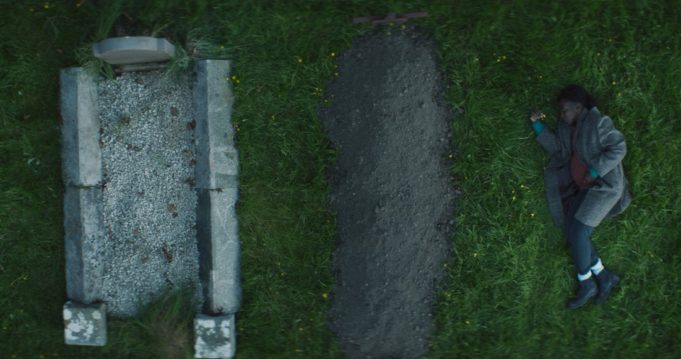The success of Get Out pretty much guaranteed that we’d get a movie like Kindred. After all, one place scarier to a Black person than an all-white American suburban enclave is a British countryside manor that has stood there for centuries. (Don’t believe me? Ask Duchess Meghan.) This psychological thriller comes to us the same week that Get Out re-releases in some of our theaters, so you can compare the two. Unfortunately, you’re likely to find that the American movie is the better one, despite the British film’s early promise.
The film starts with Charlotte Wilde (Tamara Lawrance) and her longtime boyfriend Ben (Edward Holcroft) visiting his mother (Fiona Shaw) at the house that has been their ancestral home going back nine generations. When they announce that they intend to move to Australia to start fresh, Mum’s response is, “You cannot walk out on this place!” Soon thereafter, Charlotte discovers that she’s pregnant, but isn’t sure she wants the baby because of her own abusive childhood. Ben, a busy country veterinarian, is then killed after being kicked in the head by a horse, so his mother takes Charlotte in. It becomes increasingly clear that she, her servant’s son Thomas (Jack Lowden), and the fusty old country doctor (Anton Lesser) intend to keep Charlotte prisoner until she gives birth.
Between this and Let Him Go, it’s the movies’ week for evil grandmother figures. Director/co-writer Joe Marcantonio levels up from short films to his first feature, and he effectively generates suspense early on, as Charlotte’s confinement goes from the grounds to the house to one bedroom, while constantly hearing the refrain from everyone around her: “You’re not well.” An imposing presence even when she’s playing sympathetic roles, Shaw makes a formidable villain here, more disturbing for the flashes of human emotion she shows, as during a monologue when she describes the moment she first felt love for Ben after giving birth to him. As for Thomas, he’s obsessed with quiche and, more upsettingly, marrying Charlotte and living a fairy-tale romance with her. The characters don’t address the subject of race overtly, but it’s a potent undertone as Margaret’s class and wealth buy her seemingly limitless influence with the people in the nearby town. A clever moment happens, too, when Charlotte figures out a way to fake pregnancy complications to get out of her room.
Unfortunately, the movie falls down when it tries to pay all this off. Marcantonio goes for the Rosemary’s Baby ending and resorts to an unforgivably hokey diabolus ex machina when Charlotte appears to escape from the manor. Actually, the better comparison might be the scrapped ending of Get Out, with the Black protagonist being crushed by the white system. However true this may be to reality, in a story it tends to be pointlessly depressing. Marcantonio should have followed Peele’s lead and constructed a more satisfying conclusion. He has the germ of an interesting idea in Kindred and the talent to flesh it out. If only he could have seen it all the way through.
Kindred
Starring Tamara Lawrance and Fiona Shaw. Directed by Joe Marcantonio. Written by Joe Marcantonio and Jason McColgan. Not rated.












